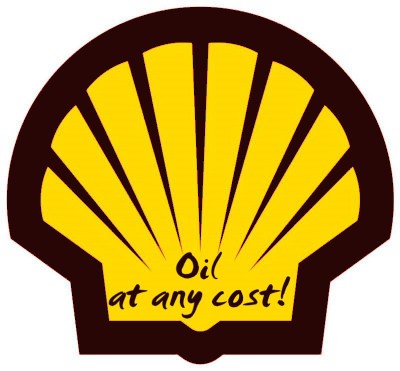Shell Sponsors Eco-Race, Continues To Destroy Planet With Tar Sands
Posted by keith on May 9th, 2009
A little nugget of potential greenwashing came to my attention this morning. As you read it, keep in mind this quotation, from Shell’s own marketing brochure:
“Unconventional hydrocarbon resources is a significant area in which boundaries are being pushed to meet growing demands. Shell is privileged to be working on one of the most important unconventional resources: the oil sands project in Alberta, Canada. We report on how new and innovative technology, coupled with working closely with the local community, has made access to this massive resource possible.”
Now here is the article – you can make up your own mind what Shell’s motivation is for having an Eco-Marathon:
Petrolheads should look away now. Engineers and racing car enthusiasts are gathering in Germany today for a car race with a difference – one that does not reward the fastest car, but focuses instead on the most fuel-efficient. In this Shell sponsored Eco-marathon, the best cars could travel the entire length of Britain five times on a single gallon of petrol.
More than 200 teams from 29 countries will battle for the €1,000 (£895) top prize in this annual green car rally, which is the biggest of its kind in the world. Futuristic, lightweight vehicles will race around the EuroSpeedway circuit in Lausitz, Germany, with the goal of burning as little fuel as possible over a set distance and producing the lowest emissions.
“For participating teams, ‘sustainable mobility’ is more than just a buzzword: these are the engineers of the future who are helping to turn it into reality,” said Jeroen van der Veer, chief executive of Shell . “Society needs a new generation of talented problem-solvers to address the world’s energy challenges.”
From the UK, teams of engineering students from the universities of Coventry, Brunel and Central Lancashire will pit their cars against more established racing teams from other countries.
John Caulderbank, motorsport course leader at the University of Central Lancashire, said sustainability was a big part of his students’ coursework. The Central Lancashire team’s car is based around a 30cc petrol engine developed in-house, coupled with a bespoke engine management system to keep fuel consumption low, and the brakes from a mountain bike. His team plans to be very careful in the style they drive, conserving fuel by only accelerating for 20 seconds out of every minute of the race, and allowing the car to coast for the remainder of the time. “The target is 3,000 miles to the gallon,” said Caulderbank.
Each prototype vehicle is judged on how much fuel it uses to complete eight laps of the EuroSpeedway circuit – a distance of around 15.5 miles (25km). The cars have to do the full course in under 51 minutes and each team gets four attempts to use as little fuel as possible.
The current records are staggering. For a hydrogen fuel cell car it stands at 3,836km per gallon, achieved by a team from the Swiss Federal Institute of Technology Zürich in 2005. In the conventional petrol and diesel-powered category, a 2004 team from Lycée la Joliverie in France designed a car with a range of 3,410km. The record for best CO2 emissions profile was attained in 2006 by a prototype from Lycée la Joliverie with a car emitting just 0.5g/km – the average for a passenger car in Europe is around 160g/km.
Christoph Bastian, programme manager for automotive engineering at Coventry University, said that being economical with fuel was a key part of the work that modern engineering students had to do when designing cars, given that the motor industry was keen to head in this direction.
The Coventry team’s car is a three-wheeler made of tubular aluminium sections. Along with the 31cc engine from a garden strimmer, it weighs just 45kg. They reduced much of the weight using computer models. “We used some advanced engineering tools to predict where the forces are going to travel in the frame and, by calculating this load path, we were able to remove material.”
The team, which is entering the Eco-marathon for the first time this year, expects to get a range of around 1,000km for a gallon of fuel. That’s nowhere near the leaderboard for this race but Bastian says he hopes to get closer to the top in coming years. For next year’s entry, the team is already planning to focus on improving their car’s aerodynamics and cladding the body with lightweight carbon fibre rather than plastic.
At the start of this year’s race, José Manuel Barroso, president of the European commission said sustainable transport would be central to meeting the continent’s climate goals. “It accounts for almost a quarter of Europe’s CO2 emissions and a third of our total energy consumption. We need to concentrate minds and efforts on helping reduce emissions and improve energy efficiency in the only sector in which emissions have increased since 1990. The Shell Eco-marathon is a key educational platform that encourages students to focus their minds on the challenge of maximising fuel efficiency, whether using traditional or alternative fuel sources.”
Shell have the following to say about their Eco-Marathon and themselves: “As an energy company, Shell is committed to reducing the environmental footprint of its operations and products, and to help meet the world’s growing demand for energy in secure and sustainable ways. The Shell Eco-marathon inspires others to think about energy efficiency and offers a platform to work on solutions in a very practical manner.”
Now I’d like you to watch this interview between George Monbiot and Jeroen van der Veer, the CEO of Royal Dutch Shell:





